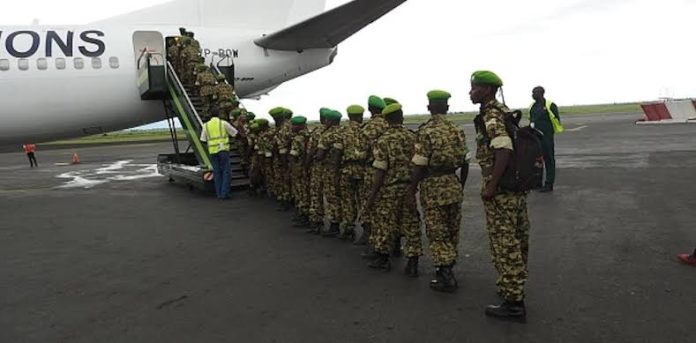Facebook Twitter (X) Instagram Somali Magazine - People's Magazine
Burundi, a key contributor to African Union peacekeeping missions in Somalia for 17 years, has announced its withdrawal from the newly formed African Union Support Mission in Somalia (AUSSOM). This decision stems from disagreements with the Somali government over troop deployment numbers under the leaner framework of AUSSOM, which is set to replace the African Union Transition Mission in Somalia (ATMIS) at the end of December 2024.
Burundi’s Legacy in Somali Peacekeeping
Burundi has been instrumental in Somalia’s stabilization efforts since 2007, deploying thousands of troops as part of the African Union Mission in Somalia (AMISOM) and its successor, ATMIS. The Burundian government recently scaled back its deployment as part of the phased ATMIS withdrawal. In December 2024, 734 troops returned home, marking the second phase of the drawdown.
Somalia’s Foreign Minister Ahmed Moalim Fiqi expressed profound gratitude to Burundian forces, praising their bravery and sacrifices in combating al-Shabaab militants and supporting Somalia’s recovery. “Their bravery is etched in history, and Somalia remains forever grateful for their enduring legacy,” Fiqi stated in a social media post.
Troop Allocation Disputes Lead to Withdrawal
Burundi’s withdrawal follows its dissatisfaction with the reduced role proposed for its troops under AUSSOM. Once deploying over 5,400 troops at the height of AMISOM operations, Burundi had hoped for a significant role in the new mission. However, disagreements over the distribution of AUSSOM’s 12,626 personnel, including 1,040 police officers, led to Burundi’s decision to exit the mission.
In a statement, Burundi’s Permanent Representative to the African Union, Willy Nyamitwe, communicated the country’s “unfortunate non-participation” in AUSSOM to the AU Peace and Security Council, chaired by Djibouti’s Eybe Abdi in December 2024.
Challenges and Regional Dynamics
The Somali government has framed the transition to AUSSOM as a step toward greater sovereignty. To mitigate potential security gaps, Somalia secured bilateral agreements for the deployment of 11,000 troops. However, the country faces logistical and financial hurdles, relying on a hybrid funding model that splits costs between UN-assessed contributions (75%) and the African Union and other partners (25%).
Ethiopia’s participation in AUSSOM remains uncertain due to tensions with Somalia over territorial integrity and maritime agreements with Somaliland. Despite Turkey brokering the Ankara Declaration to resolve disputes, recent clashes in Jubaland and allegations of Ethiopian arms smuggling have deepened mistrust. Somali officials have hinted that Ethiopian troops may be excluded from AUSSOM, with countries like Egypt potentially stepping in to fill the gap.
Counterterrorism Efforts and Future Prospects
The formation of AUSSOM comes as Somalia continues to battle al-Shabaab, a group responsible for deadly attacks across the region. AUSSOM is expected to bolster Somali-led operations against the militant group, strengthen stabilization efforts, and support humanitarian assistance.
Somalia’s Deputy UN Envoy Mohamed Yusuf reassured the UN Security Council of the country’s commitment to addressing security challenges. “This commitment addresses potential security vacuums while sustaining progress in the fight against al-Shabaab,” Yusuf stated.
The success of AUSSOM hinges on sustained international partnerships and Somalia’s ability to lead its stabilization initiatives effectively. Burundi’s departure marks a significant shift in the region’s peacekeeping landscape, underscoring the challenges of transitioning to Somali-led security operations.

